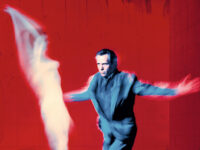Peter Gabriel, always one for the theatrical, released a double-album of interpretive music this week in Scratch My Back … And I’ll Scratch Yours, with mixed results.
The idea for Gabriel’s first new studio effort since 2002’s Up was to cover the work of others, even as the former Genesis frontman invited reinterpretations of his own work. There are times, often when Gabriel’s guests are in the spotlight, where this concept offers its genuine intrigues. However, more often than not, the project stumbles as Gabriel gets lost in his own over-curated readings.
Maybe, this should come as no surprise. The guy who once performed on stage in a flower costume — he later tackled neo-prog rock, synthesizer punk, African time signatures, MTV, Jesus, world music and heartbreak, among many other things — can’t just do a cover song. It’s going to be an event. Albeit one with piano and orchestra, this time.
That’s right. No guitars, or drums. You’ve heard of the slow-food movement? Call Gabriel’s portion of Scratch My Back … And I’ll Scratch Yours slow music. It not only took a long time to get here but, once these songs finally arrive, you hear none of the playfulness that marks his best-known hits like “Sledgehammer,” “Steam” or “Big Time” — or even the impishly chosen title of this set, for that matter.
Instead, Gabriel (with producer Bob Ezrin, of Pink Floyd and Kiss fame) digs around in his melancholy, connecting the DNA of his sound with a wider world of music that surrounds it — if that world were one where swelling strings replaced rhythm. An album needs to rise and fall, to breathe and exhale, but Gabriel’s versions can only sigh. They were trying, I think, for the dark mystery that Brian Eno brings to his later take here on “Mother of Violence,” but seem unable to free themselves from their own low-key stupor.
There are moments, surely, when it works: Gabriel’s midtempo reimagining of “Boy in the Bubble” provides a bright surprise: This new chance for an intimate examination of Paul Simon’s fascinatingly elliptical composing style — something almost lost on the galloping version from Graceland. Simon returns the favor with a sweetly ruminative version of “Biko.” A sharp-edged take on “Flume” from Bon Iver works perfectly in this context and, in keeping, so does the ghostly bluegrass of Bon Iver’s “Come Talk to Me.”
Those were the rare exceptions, however, as a trend quickly emerged: Gabriel’s guest artists have more consistent success than he did in executing this tricky concept. Too often, on the Gabriel cuts, he seems to fall into something approaching a Shakespearean soliloquy. There is an eerie moodiness throughout; even the romantic asides feel like a lonely late-night phone call. And so we have “Listening Wind,” a Talking Heads album cut that all but begs for a snare smash, a synthesizer zap, a riff. Meanwhile, Gabriel’s “I Don’t Remember,” handled by David Byrne, fares much better — as the former Heads frontman inbues the track with an itchy nihilism.
“Philadelphia” doesn’t do enough to differentiate itself from Neil Young’s sweetly memorable hymn featured on the film soundtrack of the same name. And Gabriel almost turns a scuffed-up Lou Reed song, “The Power of the Heart,” into something Disney-ish and treacly — not an easy task. But check out Randy Newman’s ruminative deconstruction of Gabriel’s “Big Time.” It’s a quiet, but insistent, revelation. And the late Reed himself seems to take his own delicious time in dismantling “Solsbury Hill” amid a storm of talk-singing feedback.
Most interesting, of course, should have been Gabriel’s take on Radiohead’s “Street Spirit,” since that band seems to be influenced in part by Gabriel. Instead, he slows down an admittedly already very slow song to the point where it sounds like a drunk going all the way to the bottom of the bottle. Conversely, Arcade Fire does an admirable job of exploring their own debt to Gabriel on a propulsive redo of “Games Without Frontiers.” It’s a frustratingly uneven experience.
Not that Gabriel’s reinterpretations are a complete wash. He kneads the opening “Heroes” into a mournful cry, almost a requiem for those gone off on lost causes — and the mirror image of the soaring original by David Bowie. Meanwhile, “The Book of Love” (originally by the Magnetic Fields) seems to poke a hole in the billowing seriousness that nearly smothers this project: “The book of love,” Gabriel sings, “is long and boring — no one can lift the damn thing.”
That works as a sadly revealing criticism for this admirably conceived, but ultimately flawed project. Cut in half, and lightened up just a bit, it might have been a success.
[amazon_enhanced asin=”B0035J6TAI” container=”” container_class=”” price=”All” background_color=”FFFFFF” link_color=”000000″ text_color=”0000FF” /] [amazon_enhanced asin=”B008BSPQ3E” container=”” container_class=”” price=”All” background_color=”FFFFFF” link_color=”000000″ text_color=”0000FF” /] [amazon_enhanced asin=”B00E1ZIZ6G” container=”” container_class=”” price=”All” background_color=”FFFFFF” link_color=”000000″ text_color=”0000FF” /] [amazon_enhanced asin=”B00E6F15HM” container=”” container_class=”” price=”All” background_color=”FFFFFF” link_color=”000000″ text_color=”0000FF” /] [amazon_enhanced asin=”B00E1ZIZ3O” container=”” container_class=”” price=”All” background_color=”FFFFFF” link_color=”000000″ text_color=”0000FF” /]
- Nick DeRiso’s Best of 2015 (Rock + Pop): Death Cab for Cutie, Joe Jackson, Toto + Others - January 18, 2016
- Nick DeRiso’s Best of 2015 (Blues, Jazz + R&B): Boz Scaggs, Gavin Harrison, Alabama Shakes - January 10, 2016
- Nick DeRiso’s Best of 2015 (Reissues + Live): John Oates, Led Zeppelin, Yes, Faces + others - January 7, 2016


